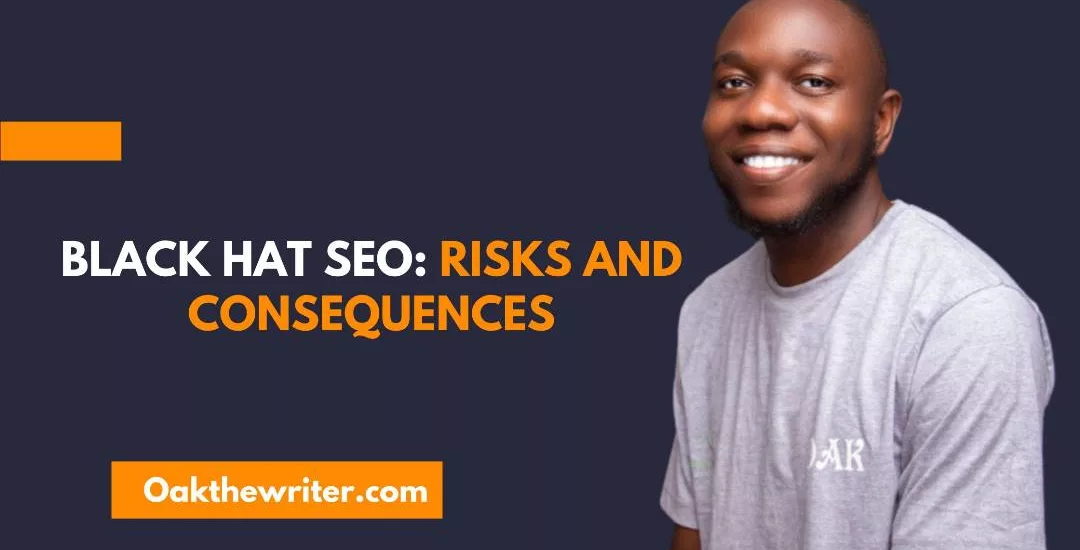SEO is a complex business, but getting caught in shady tactics will only prompt your website to suffer.
Implementing Black hat SEO may look like the best way to get quick results by ranking higher, but it will hurt your website in the long run.
Let’s dive into this article to learn more about the pitfalls of black hat SEO, its risks, and its consequences.
What is Black Hat SEO?
Black Hat SEO is a set of practices used to increase a site’s ranking in the search engine. These unethical practices attempt to manipulate search engine algorithms and violate its guidelines.
Search engines such as Google and Bing clearly state that this type of practice doesn’t align with their regulations. They are also clear on the potential outcomes that can arise if one indulges in it. Using black hat SEO techniques can lead to lower ranking positions, a decline in organic traffic, or severe cases, the removal of the site on the search engine result page.
Black Hat SEO vs White Hat SEO
Black hat SEO goes against the search engine’s guidelines. Since its goal is to manipulate SEO strategies and gain higher rankings, it can lead to demotion or being removed from the search results.
On the other hand, white hat SEO is the most ethical way to rank on the search engine result page. It involves respecting Google’s guidelines by creating high-quality content that answers users’ questions and is useful to them. White hat SEO takes time and requires lots of effort and consistency. If you are patient and do it the right way, you don’t have to worry about your ranking status even when a new algorithm is released.
What matters instead is that you produce quality content that offers valuable information to your users and implements strategies that are sustainable and will yield positive results in the years ahead.
Black Hat Techniques in SEO
There are many techniques in which black hat SEO takes place. Some of these techniques include:
Keyword Stuffing
Keyword stuffing is the practice of filling a piece of content with unnecessary and irrelevant keywords to manipulate the site’s rankings on the search engine result page. Adding multiple keywords to your content when it adds no value only ends up creating a bad experience for your users.
Google explains keyword stuffing as:
- Repeating the same words or phrases many times that it sounds unnatural
- Block of text listing cities and states a web page is trying to rank for
- List of phone numbers with no substantial value.
Here is an example of keyword stuffing for a website selling designer clothes.
“Hello! Welcome to ABC company where we sell designer clothes. We promise to make you elegant and luxurious while you rock your designer clothes anywhere you go. If you are thinking of where to get designer clothes, do get in touch with us. We promise to grant you exceptional service when you shop for your designer clothes from us.”
I’m sure you’ll agree, that sounds a bit off. It’s quite easy to spot the stuffed keywords and Google can tell that the content sounds unnatural too. Repeating your main keywords won’t help you to rank. Instead, it will only cause some adverse effects you wouldn’t want.
Sneaky redirects
A redirect occurs when you send your readers to a different URL other than the one they first clicked. Black hat SEO utilizes redirects outside of its original purpose. For instance, they can redirect a crawler bot to one page while they redirect other users to another page.
Another example is when they redirect a highly authoritative page with lots of backlinks to an irrelevant page, just to boost its rank.
Redirects should only be used for the purpose for which they were created. This can happen when you want to consolidate two pieces of content or change a website domain. Sneaky redirects, on the other hand, must be avoided. Redirecting users or search engines for the sole purpose of manipulating the search results can get your site penalized. They violate the guidelines of search engines.
Cloaking
Cloaking refers to the practice of showing a piece of content to a user and a different piece to another. Websites that engage in this act often do it to make their content rank for the irrelevant terms in their content. Spam websites also do it to avoid search engine bot that finds out the spam content they provide for their users.
It’s okay to tailor your content to different groups of users. For instance, you may reduce the size of your website when a mobile user visits your site. You may also change the language based on the country the user is visiting from. All these are acceptable.
But what isn’t available is when you aren’t changing the content that appears to the search engine crawlers. Instead, you should treat the crawlers the same way you treat the users. If you want to compare what Google sees to your users, you should use the fetch as a Google tool.
Paid links
Search engines such as Google use backlinks to rank content. If they notice that a lot of websites are linking to yours, they will rate your website as an authoritative and trustworthy source. This will help to increase your ranking on the search engine result page.
Due to this reason, some users have taken advantage of this ranking method by selling backlinks to their sites. Here, they ensure that other site owners pay them to place a link to their content
Many search engines, including Google, are strictly against the buying and selling of links. According to their website, they stated that “any links intended to manipulate PageRank or a site’s ranking in Google search results may be considered part of a link scheme and a violation of Google’s Webmaster Guidelines.”
This includes sending products to a website in exchange for links or paying another site to link to your content. If they find out about such an act, they can penalize both the buyer and seller.
Poor quality content
Another black hat SEO technique is poor-quality content. They refer to any content copied from other websites. They offer no value to the readers. At first, search engines like Google weren’t good at recognizing duplicate content. However, the algorithmic Panda update in 2011 solved this issue.
Any site with duplicate content witnesses a decrease in its ranking status. Besides, some publishers may take legal action for duplicating their content. To avoid this scenario, you should write in your voice. For instance, you can provide additional information and include original photos to make your content unique.
Also, the “bait and switch” method is a popular black hat method used through content. Here, the SEO expert starts by creating content for the topic they want to rank for. Once it starts ranking, they switch the content to a different one. This creates a bad experience for the users as they can’t see the content they were hoping to see. Besides, it misleads the search engine and could later harm their SEO.
In addition, adding invisible keywords is another practice Google stands against. They do this by ensuring that the text color aligns with the page background. In other words, when these web pages pop up in the SERP for these invisible keywords, there’s no visible content about them.
When a searcher clicks on the page hoping to get what they are searching for, they may not find the content as the keywords are invisible. If you intend to solve your readers’ problem, there should be no need to hide content on your website.
Link Farms
A link farm is a collection of websites built for the sole purpose of link building. Each website links to a site in a bid to rank higher on search engines. They inflate the number of backlinks a website possesses.
Link farms often have low-quality content with lots of links. Each link contains the keyword they want the site to rank for. However, it is best advised to desist from this act. Why? Search engines like Google can easily detect links farms and penalize websites engaging in such acts.
Private Blog Network
A private blog network (PBN) is a bunch of authoritative websites that solely exist for link building. They are similar to link farms as they both inflate the number of links a website has. However, the difference is that they only link to the main website.
Their process entails buying expired domains that already have authority. Then, they create content similar to the expired domains and link to their site. They hope that the search engines won’t notice while hoping to increase their ranking status.
However, search engines have become smarter than before. They can spot PBNs and could sanction the site with a severe penalty.
Misusing structured data
Structured data includes schema and rich snippets. They enable the search engine to understand what your content entails. They provide additional information and tend to have higher click-through rates (CTRs).
You can add structured data to a page displaying books, recipes, or other products and services that you offer. This enables you to stand out from competitors and even boost organic traffic.
Although having structured data for your piece of content is highly beneficial, one can engage in black hat SEO using structured data. They can provide inaccurate information to fool users and search engines. They can also include lots of keywords in your schema markup.
For instance, someone engaging in this act can post fake product reviews so that they can stand out on the search engine result page. This practice can harm your ranking and even get you penalized by Google.
Blog comment spam
This black hat technique refers to the practice of including a link to your website in the blog comments. It is a spammy method of getting links to your website. This practice doesn’t often happen nowadays as search engines like Google updated their algorithm to discount such links.
Although authoritative blogs now make links in blog comments, search engines do not follow these links. If you own a forum, publication, or community, people or bots can spam the comments section. All you have to do is to ensure the comment section isn’t spammed.
You can mark the section as no follow. This tells the search engines to ignore such comments. If this isn’t done, it can harm your website and make it look unprofessional. In severe situations, search engines such as Google can penalize these pages.
Consequences of Black Hat SEO
Engaging in black hat SEO often causes significant consequences. Some of these consequences include:
It results in a poor user experience
When the content on your web page is of poor quality or looks like spam, visitors can abandon your website as soon as they visit. Once the search engine notices this, they tend to decrease your ranking and may even remove your website from the search engine result page.
This is why you should always work with an experienced SEO specialist who understands and implements the rules of white hat SEO. They can implement ethical SEO practices that can help to make your website trustworthy.
It can negatively impact your SEO
When you engage in black hat SEO, search engines such as Google can issue penalties. These penalties range in different types. Some of these penalties you should try to avoid include keyword level, directory level, domain-wide, hostname level, and delisting.
Google can implement these penalties if they see that your pages engage in black hat SEO. They can remove your page from their search result. To avoid suffering from these actions, you should rely on white-hat SEO practices.
It can lead to significant losses
If you engage in black hat SEO, your website could lose traffic and visibility which can eventually impact the conversion rate on your site. This can lead to a decline in the revenue generated for your business and force you to invest in paid media (PPC).
Black hat SEO works for a short time
If you are looking to get a quick result, black hat strategies are your best shot. They can build your site quickly and give you the rankings you desire within a short period. In fact, you must have heard stories of how people rank quickly by buying links or keyword-stuffing their content.
But you should know that this strategy doesn’t last. Not only are these strategies ineffective, but they also affect your SEO in the long run. For instance, the use of spammy links can negatively affect your brand’s reputation. Even if you remove the spammy links and start producing content through an honest strategy, it can be difficult to recover from the damage done if you have used black hat SEO tactics in the first place.
Black hat SEO doesn’t create the best user experience, which is one of Google’s core mandates. When users aren’t getting the best experience from your website, it signals to Google that something needs to be done.
When Google finds out that you have been implementing black hat SEO strategies, you potentially risk getting penalized or having your website removed from Google.
In short, you can increase your ranking status due to black hat tactics. However, it won’t last for a long period. It isn’t a sustainable practice as Google will find out and penalize your website for engaging in such an act.
You will eventually be discovered
If you think that your black hat SEO tactics will work, you are wrong. It’s only a matter of time before you get caught and penalized by Google or any other search engine that you use. This means that you could lose your rankings to competitors who engage in white-hat SEO practices.
What many black-hat SEO specialists don’t realize is that Google keeps releasing algorithms specifically designed to combat these tactics. The more people use them, the better the algorithm gets at identifying spammy or low-quality content.
So far, Google has released various algorithmic updates to weed out these low-quality sites. This means black hat SEO practices are no longer effective for your SEO strategy.
White hat SEO takes time and effort but it’s worth it
Building a site that is useful to your users can take lots of time, effort, and consistency. Think about it. You need to invest in your content by performing keyword research, crafting quality content, building links, building trust with your audience, and staying consistent over time.
But it is better to follow these proper guidelines than get penalized or removed completely by Google. Stick with white hat SEO and enjoy the benefits in the long run.
Conclusion
SEO is an ever-evolving field. Engaging in black hat SEO because it achieves quick results isn’t the best option. It could provide a poor experience for users, get your website penalized, or be eliminated by Google.
That isn’t the kind of result you desire. The best option is to engage in white-hat SEO. Create quality content that offers valuable information to your users, build links appropriately, create trust, and you will reap the benefits over time.









